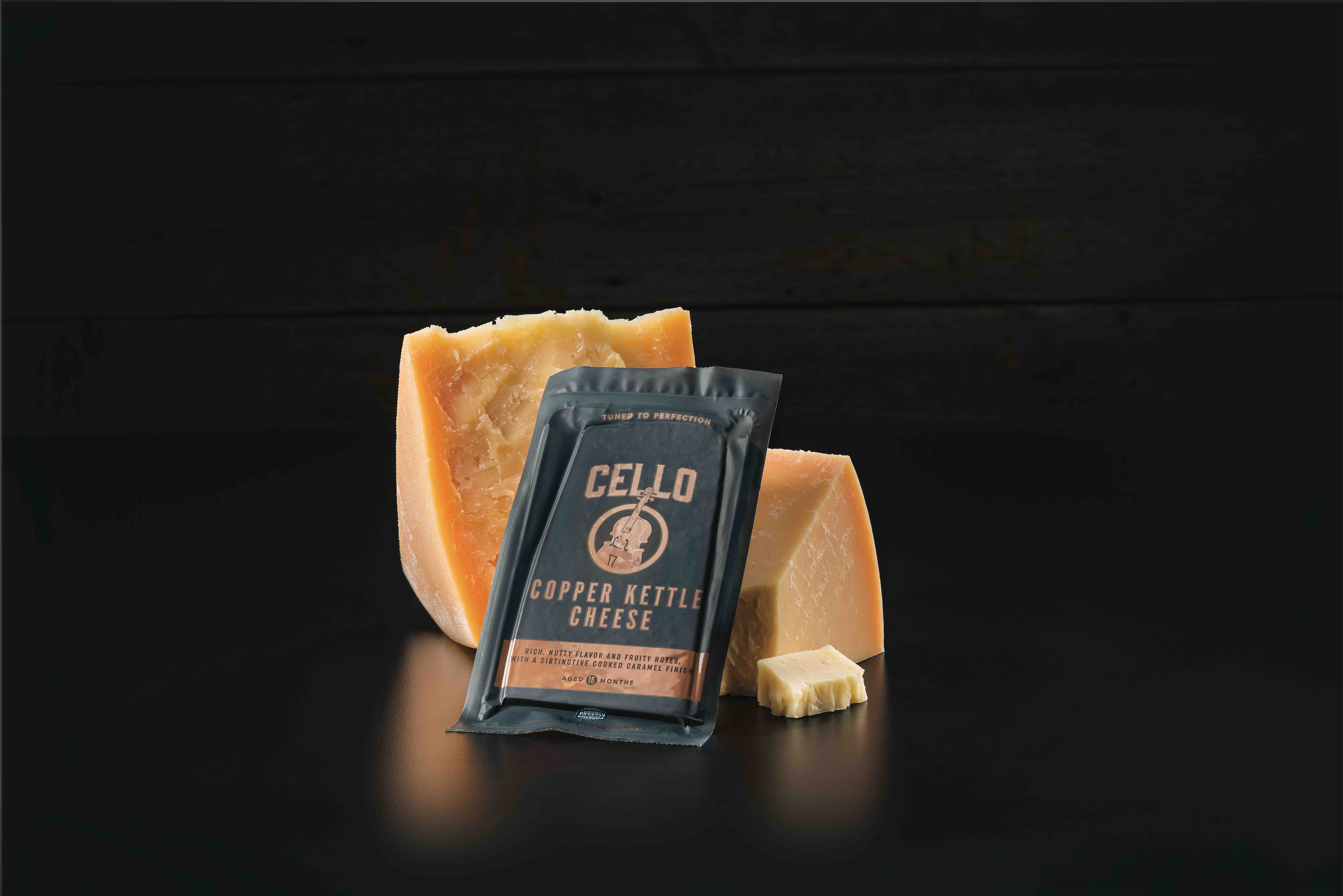With over 75 years of experience, Cello Cheese cheesemakers understand the delicate process behind making great cheese. One of the keys to creating unique flavor profiles and textures for our cheeses depends upon the aging process. While age is “just a number” for humans, cheese aging is an extraordinary process! Follow along to learn more – this is a story for the ages.
What happens when cheese is aged?
You weren’t born yesterday, and neither were most cheeses. Before we school you on how cheese is aged, it’s best to understand the basics of making cheese.
Making cheese requires four basic things: milk (unless you’re a plant-based cheese), cultures/bacteria, rennet, and salt.
Using art and science, cheesemakers heat up the milk, add the appropriate cultures (to change lactose into lactic acid) and rennet (to help the milk solidify), separate the curds from the whey, and use those curds to form their desired cheese.
Some cheeses, like mozzarella and mascarpone (more on that below), stop here and are ready to be packaged and enjoyed.
But some cheeses require aging. Also referred to as ripening or maturing, this process allows the cheese and its proteins and fats to continue breaking down and hardening into a specific type of cheesy deliciousness. Cheesemakers accomplish this through:
- Process – every aged cheese is nurtured intentionally to become its true self! Does it require a wax, wrap or rind? Consider the holes formed in swiss cheeses through adding specific bacteria. Perhaps aroma or spice is achieved, like Cello Rubbed Fontals. All of these characteristics are determined and developed using specific processes while the cheese matures.
- Conditions – while we all know about “man caves” and how to create a space where dudes can retreat and relax, have you heard of a cheese cave? That’s right – amateur and professional cheesemakers alike may consider a haven for cheese to ripen optimally. Key components include high humidity and proper air circulation.
- Temperature – as you may have guessed, temperature also plays a role in cheese aging. On average, cheese is aged at 50 to 55°F (12 to 15°C) but some cheeses, like brie, blue and Roquefort require lower temperatures, approximately 40 to 45°F (4 to 7°C).
- Time – a cheese’s character will develop in time, and the amount of time required to create a specific cheese profile varies. Read on to learn more about the length of time required for cheese aging.
How long can cheese be aged?
The amount of time for aging cheese varies based on the type, perhaps most notably hard versus soft cheese.
Cello Copper Kettle cheese is a hard cheese aged for 16 months to create a distinctive tasting experience through the natural fermentation of cow’s milk.
Conversely, Cello Mascarpone cheese is a soft spread and is not aged. Its texture and flavor require moisture and freshness.
Here’s a handy chart to show the amount of time each Cello Cheese is aged. Notice how the length of time aged correlates with texture?
| Type of Cello Cheese | Amount of time aged | Texture | Flavor Profile |
|---|---|---|---|
| Copper Kettle | 16 months | Hard | Robust,seet |
| Parmesan | 12 months | Hard | Bold, nutty |
| Asiago | 10 months | Semi-hard | Subtly Sharp |
| Romano | 6+ months | Hard, crumbly | Piquant |
| Fontal | 3 months | Soft | Mild |
| Mascarpone | N/A | Soft | Sweet, smooth |
Cheese, especially cheddar varieties, can be aged for several years, depending on the type and desired flavor or texture. Recently, a 21-year-old Parmesan cheese was auctioned off for charity. You’ll be hard-pressed to find a cheese like that again!
Will aged cheese go bad?
Yes, aged cheese can go bad, but it has a longer shelf life than unaged cheese due to lower moisture content. When unopened and refrigerated, aged cheeses can last several months. Once opened, these cheeses can last several weeks in the refrigerator. Check out these tips for extending the shelf life of cheese.
Does cheese improve with age?
Most people would agree that like a fine wine, cheese improves with age. As humans mature, we often improve too – even the most elite cheese snobs have room to grow. We get one step closer to getting comfortable in our own skin and growing in contentment. Yet, everyone peaks in their own time.
At Cello, we pride ourselves on the artistry or our cheeses and our ability to cultivate their development through the aging process. However, we respect every cheese lover’s flavor preferences. Long-aged cheddars sometimes prove too sharp for some. Others cannot stomach the smell of Parmesan, which develops its flavor during a one-year aging process. The bottom line is, the more a cheese ages, the more its inherent flavors and textures come to the surface to be enjoyed.
If you are lactose intolerant, a longer aged cheese has even more perks than palate-pleasing. The younger a cheese is, the more lactose it contains. As cheese ages and ferments, the lactose sugars are further and further broken down, making the cheese harder and the lactose lower.
Just as beauty is in the eye of the beholder, good taste is in the palate of the eater.
Looking for a simple, easy way to sample cheese and help your taste buds blossom? Try something new with Cello Cheese flights from a store near you.





